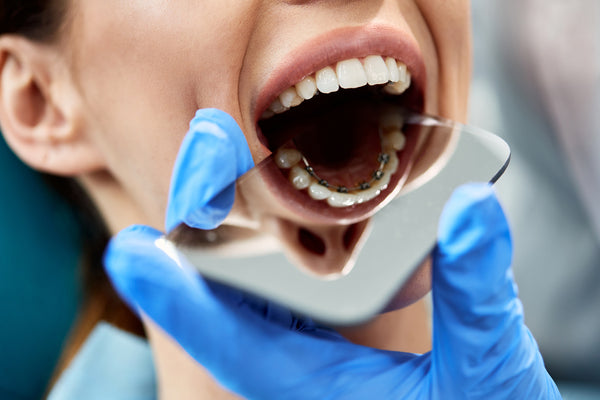FAQs About Lingual Braces: Answered by an Orthodontist

Lingual braces have gained immense popularity in recent years as a discreet and effective orthodontic treatment option. If you are an adult looking to straighten your teeth, it is understandable to want to do this without drawing unwanted attention from others, this is where lingual braces can help.
We understand that lingual braces are a less talked about form of brace treatment, but our team here at Northenden House Orthodontics, a specialist orthodontist in Manchester, wants to shed some light on just how effective this form of treatment can be, even for more complex cases of misalignment.
So, if you are curious to learn more about lingual braces and if they could be a suitable option for you, we have compiled 8 FAQs that will hopefully help you on your way.
What are Lingual Braces?
Lingual braces are an orthodontic appliance that is fixed to the back of your teeth, making them very discreet. It is a brace system composed of small brackets and archwires that are custom-made to fit the individual shape of your teeth, and are then bonded to the back of the teeth, making them virtually invisible to others.
What’s the Difference Between Lingual Braces and Traditional Braces?
The main difference between lingual and traditional, metal braces is placement. Traditional, metal braces are made up of metal brackets and archwire that are fitted to the front of the teeth and lingual braces are fitted to the back. Lingual braces are chosen by those who want a more discreet option for teeth straightening but still want to get the same results as a traditional brace. For your orthodontist to achieve the results they want, they will adjust the metal wires, the same as they would do with a traditional brace.
Are Lingual Braces Suitable for Everyone?
While lingual braces are a fantastic option for many patients, they may not be suitable for everyone. The complexity of your orthodontic needs, the size of your teeth, and your bite may influence whether lingual braces are the right choice for you. For example, patients with very deep overbites may experience brackets popping off their teeth more frequently. Our team here at Northenden House Orthodontics can assess your specific case and help determine the most suitable treatment plan.
How Long Are Lingual Braces Worn for?
The duration of treatment with lingual braces is typically comparable to that of traditional braces. The length of treatment depends on various factors, including the severity of your orthodontic issues and how well you follow your orthodontist's recommendations. For most, lingual braces will need to be worn between 12 – 18 months but you may need to wear them for as long as 36 months if your case is particularly complicated.
Are Lingual Braces Painful?
Like traditional braces, patients may experience some discomfort when they first get lingual braces fitted and after adjustments. The tongue may also need some time to adjust to the presence of the braces, however, the level of discomfort is usually temporary and can be managed with over-the-counter pain relievers.
How Often will I Need to Visit My Orthodontist?
Once your lingual braces have been fitted, your orthodontist will need to see you regularly to ensure that your treatment is progressing, your oral hygiene is maintained and to carry out adjustments. At our specialist-led orthodontist in Manchester, we advise patients to attend appointments every 6 – 8 weeks.
How do I Maintain Oral Hygiene with Lingual Braces?
Maintaining good oral hygiene is crucial during orthodontic treatment, regardless of the type of braces. With lingual braces, cleaning the backside of your teeth may require a bit more diligence and our orthodontists often recommend special brushes and flossing tools to help reach between the brackets and wires effectively. Tools such as interdental brushes and floss threaders are useful for removing food particles from between the teeth, around your braces, and in any hard-to-reach areas. Dental water jets are also useful to help loosen food particles and wash them away.
Will my Speech be Impacted by Wearing Lingual Braces?
It is possible that wearing lingual braces may alter your speech slightly. The placement of the braces can reduce the amount of space your tongue has to move to form sounds when you speak and, in some cases, can cause a temporary lisp. It is important to remember that this alteration in speech is only temporary, as your mouth gets used to the brace. We recommend talking as much as possible during the first few days to help your speech fall back into line.
Looking for Lingual Braces in Manchester? Northenden House Orthodontics can Help
Your search for lingual braces in Manchester may well be over, as our team of specialists at Northenden House Orthodontics has been providing high-quality, private orthodontic care to patients in Manchester and surrounding areas for over 40 years.
Lingual braces are one of our most popular hidden brace systems and we use them to treat a wide variety of orthodontic problems. Our chosen brands are:
- Incognito - this appliance is custom-made from gold and created from state-of-the-art technology to ensure an exact fit to your teeth. The Incognito brace provides fast and predictable results whilst being less likely to lead to decalcification and decay, as traditional braces sometimes can.
If we have answered your questions and you feel that lingual braces might be the perfect solution for you, contact our specialist-led orthodontist in Manchester today and start your journey to a beautiful smile.
- Mohammad Malik

